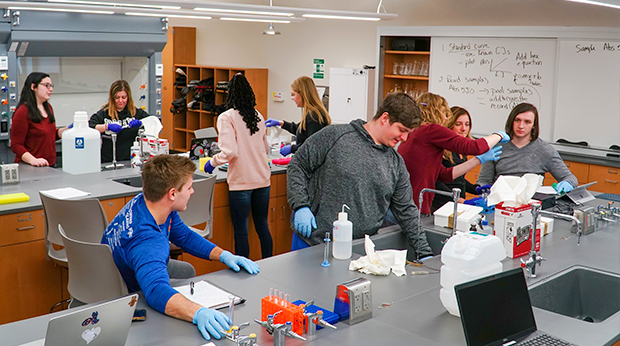
Biochemistry
Through a chemistry-based curriculum and sophisticated laboratory experiences at La Roche University, you’ll gain a solid biochemical foundation for understanding the human body, diseases and treatments.
At the heart of life science, biochemistry is the study of the structure, composition and chemical reactions in living systems. Biochemists study cell development and growth, analyze DNA and other molecules, and work in basic and applied research.
Curriculum
The biochemistry major at La Roche University offers a starting point for you to enter either the biotechnology sector or graduate-level studies.
The program exposes you to a year of biochemistry lecture and lab, along with courses in cell biology and molecular biology. This combination offers a complete picture of biochemistry and hands-on experiences in the lab.
You’ll conclude your undergraduate career with physical chemistry and physical biochemistry, along with seminar courses that explore primary literature.
Expert Faculty
You’ll work with full-time professors who have Ph.D.s in chemistry, extensive post-doctoral experience and connections with local universities.
Faculty includes an award-winning professor whose research has appeared in various national and international scientific journals.
Real-World Opportunities
Fully operated by La Roche students, our ChemSOLVE program simulates real-life service labs for you to engage in authentic research.
Dual Degrees
We offer pathways for you to apply biochemistry to the fields of engineering, health care or medicine. One way to maximize your professional potential is to combine your bachelor’s degree in biochemistry with a degree from an area institution.
University of Pittsburgh’s Swanson School of Engineering
This joint program allows you to earn a bachelor’s degree in biochemistry from La Roche and an engineering degree from Pitt.
Lake Erie College of Osteopathic Medicine (LECOM)
This option offers an early acceptance to medical, dental or pharmacy school with the largest medical school in the nation.
What Can You Do With Your Degree?
Biochemists often collaborate with chemists, physicists, engineers, environmental scientists, health care professionals, zoologists and government specialists. These professionals find work in:
- Hospitals
- Universities and colleges
- Agriculture, food industries and cosmetic industries such as the Department of Agriculture, National Institutes of Health, the Environmental Protection Agency, and the Food and Drug Administration
- Forensic crime laboratories or law enforcement
- Industrial labs and drug manufacturing
- Journals and science writing
The program also prepares you for graduate programs in biochemical sciences, or medical, dental or veterinary school.
